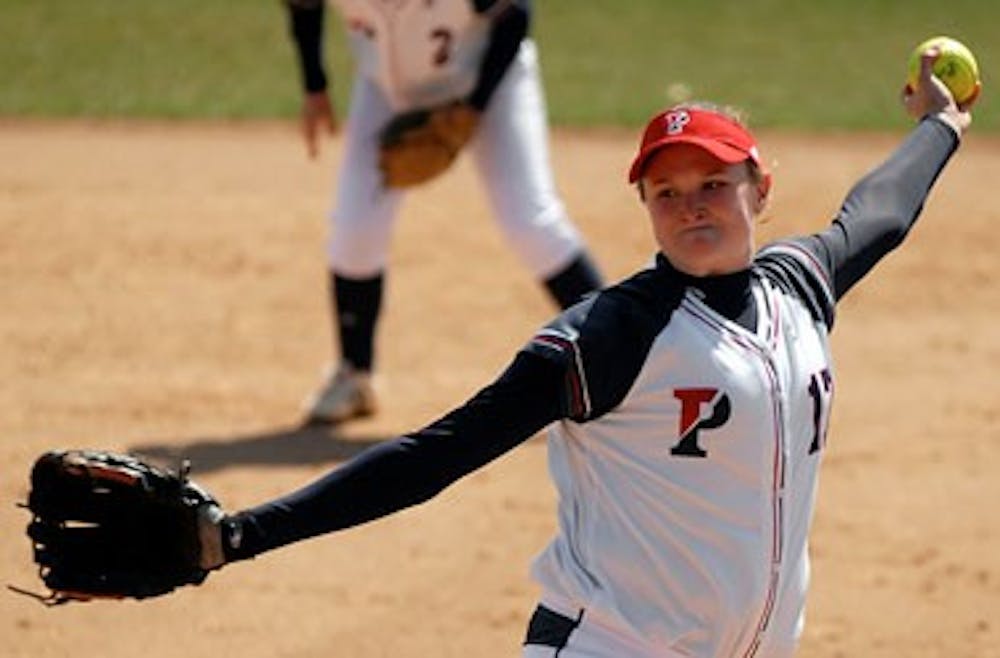Although former softball ace Jessie Lupardus is no longer on Penn’s roster, she continues to support Penn Athletics — albeit in a different manner than most.
In February 2010, Lupardus opted to leave the team in order to focus on her mental well-being. While she had a successful career with the Quakers — the left-handed pitcher was named 2008 Ivy League Rookie of the Year, and struck out 268 batters in 271 and one-third innings with an ERA of 1.96 — Lupardus was unhappy.
“My specific story has a little more nuanced complications,” she said. “In a lot of situations, there are sometimes a lot of minor aggravating factors that create this perfect storm — that happened in my case.”
But the Birmingham, Ala., native didn’t let this storm overcome her. Instead, she used it as a tool to address issues she believes plague other Penn athletes as well.
Last spring proved to be a pivotal time for Lupardus. Following the April death of football captain Owen Thomas and the annual Take Back the Night event against sexual violence, Lupardus was inspired to encourage athletes on campus to break the silence surrounding mental health issues in the athletic community.
“I was so moved by the bravery in people telling their stories and how important it was for that community as well to not stay silent,” she said, “and to let their own voices be heard, if not to the people that were there … but to themselves.”
Lupardus, a senior psychology major, used a program created at the University of Tennessee’s athletic department as a model to put her idea into action. Tennessee’s Team Enhance, a comprehensive program comprised of clinicians, social service workers, physicians, athletic trainers and coaches helps female athletes recover from mental health disorders and injuries.
She then approached senior associate director of Athletics Alana Shanahan, who put her in contact with Counseling and Psychological Services deputy director Denise Lenksy and director of the Center for Sports Psychology, Joel Fish. The group worked together and created a message to present to leaders of athletic teams.
“Jessie really played a pivotal role and just took so much initiative,” Lenksy said. “She was just really instrumental in speaking from her experience as a member of a team here, just having such valuable perspective on what would be the most important kernels of information we could impart in a brief concise format.”
Lupardus said she believes the philosophy invoked in sports cliches like “suck it up” and “no pain no gain” may be effective on the court or the field, but is detrimental in dealing with personal problems.
“They get you through conditioning when all you have is adrenaline and lactic acid; they work. But when that extends outside the boundary of the field or the court, that’s when its dangerous,” she said.
“We’ll think that we can handle it and be Superman and suck it up and do it because that’s part of the essence of being a great athlete. But you can’t suck up psychological symptoms.”
According to Lensky, there is an obstacle associated with the fact that athletes want to “keep things within the team.”
Fish, who has worked with the Penn athletic community for 11 years, had a good feel for the culture and also provided information about the effects of depression in athletes.
Ultimately, the message presented at the monthly team leaders meeting consisted of a need for visibility, validation and support of student-athletes suffering from these mental health issues.
According to Lupardus, once the silence surrounding these issues is broken, athletes can then seek external resources and gain the support of their teammates and coaches.
Following the presentation to the student-athletes in October, Lupardus and her colleagues were given the opportunity to speak at a coaches meeting in November.
“I think the fact that the athletic department was willing to take hold of this idea and run with it and be fully supportive was definitely a testament to the fact that people here care,” she said.
Neither Lupardus nor Lensky are aware of any increased student-athlete participation at CAPS, but both said they feel the message was well-received by its intended audience.
Lupdardus will graduate in May and may continue working on this project before attending graduate school. She said she hopes people both inside and outside the Penn community will continue to embrace her message.
“You can see what silence does, we can learn from it. We can learn from [Owen’s] silence and speak out now. And I hope that people take that to heart. I hope we have no other athletes that commit suicide,” she said.
“It really is indicative of how hard it is to be a Penn student and an athlete and what these pressure situations can do. We’re only human — we hate to admit that as athletes, but we’re human.”



